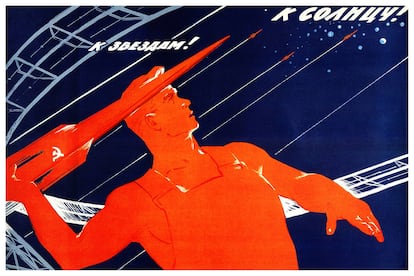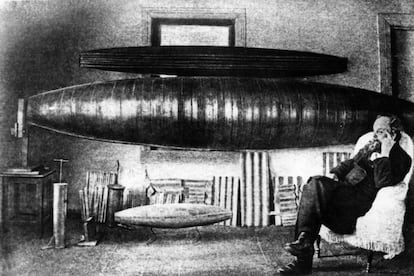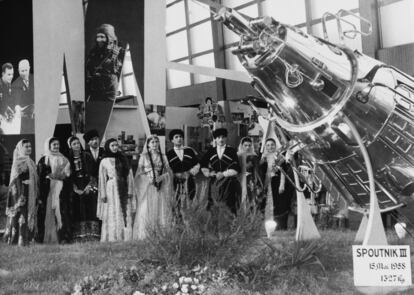Russian cosmism: inspiring Putin and Musk with ideas of immortality and space colonization
The intellectual movement of the late 19th century influenced the Soviet space race and contemporary transhumanists in Silicon Valley


The ultimate goal: to achieve immortality for all and resurrect every soul that has ever lived. But it didn’t stop there – humanity would colonize the cosmos, securing its everlasting existence.
Russian cosmism was an intellectual movement that emerged in late 19th century Russia. It believed in a deep connection between humans and the cosmos, beyond our daily, earthly lives. Although the movement has long since vanished, its ideas continue to inspire influential figures like tech entrepreneur and SpaceX founder Elon Musk and Russian President Vladimir Putin, who plans to revive Russian space exploration. Cosmism’s ambitions of immortality can also be seen in transhumanist movements rooted in Silicon Valley’s techno-utopian ideals.

Russian cosmism was explored in a collection of essays edited by philosopher Boris Groys (Russian Cosmism, MIT Press, 2018) and in the more recent Lenin Walked on the Moon (2023) by Michel Eltchaninoff. The Groys compilation features one of the founders of cosmism, Nikolai Fyodorov, who refused to publish during his lifetime, limiting his ideas to a small circle of friends and collaborators. Other contributors include Soviet space scientist Konstantin Tsiolkovsky, Alexander Bogdanov and Alexander Chizhevsky. Cosmism drew in a wide range of individuals, including radical anarchists, occultist poets, revolutionary activists, philosophers, utopian novelists, and pioneering space travel scientists. Fyodorov’s ideas were also admired by acclaimed Russian authors Tolstoy and Dostoevsky.
According to Groys, cosmism remained mostly hidden, despite its vast scope. This was due to the Stalinist suppression of significant philosophical and artistic advancements that originated in Russia during the late 19th and early 20th centuries, such as theosophy and Malevich’s suprematism. However, cosmism profoundly influenced the core of the Soviet Union, molding its fundamental beliefs and aspirations.
From the mystical to the Soviet
The concept of cosmism, which aimed to immortalize humanity and explore the vast expanse of space, originated in the late 19th century, writes Eltchaninoff. It emerged during a time of religious resurgence and growing confidence in scientific advancements. While Fyodorov didn’t embrace Marxist ideologies, his cosmist ideas became interconnected with the revolutionary vision of a new human that emerged from the 1917 Bolshevik Revolution. As a result, some intellectuals and revolutionary leaders embraced cosmism and envisioned a homo sovieticus – a new Soviet person – who could defy death and escape terrestrial gravity.
The body of Vladimir Ilyich Lenin, the leader of the Soviet revolution, is currently preserved in a mausoleum on Moscow’s Red Square. This was not just a tribute to his importance, but also an intentional alignment with Fyodorov’s philosophy. According to historian Martín Baña, “The politician in charge of Lenin’s mummification – Leonid Krasin – was deeply influenced by Fyodorov’s ideas, and he wasn’t just paying homage to the man.” Preserving Lenin’s body represented the idea that humanity, when liberated from capitalism, could attain immortality, and Lenin would be among the first to be resurrected. At the same time, a Lenin associate named Alexander Bogdanov conducted blood transfusion experiments with the goal of achieving eternal youth, while the Soviet Union actively engaged in a space race with the United States.
The USSR successfully launched the first satellite – Sputnik – into orbit in October 1957. A month later, they sent the first living being into space – a dog named Laika. Then in 1961, Russian Yuri Gagarin became the first man in space. The United States took the lead by successfully sending the first man to walk on the Moon, but there is ongoing debate about which country achieved more in space exploration during that period. According to Eltchaninoff, cosmism was a secret ideology of the Soviet Union. In fact, Tsiolkovsky, the physicist and rocket scientist hailed as the “father of cosmonautics” was dedicated to cosmism and made it a major intellectual theme in the Soviet space program.”Tsiolkovsky actually brought more than just a philosophy and space ethics to the program. It went beyond the Cold War geopolitical competition and aimed to spread communism throughout the entire universe,” said Baña.
Like many utopian movements, cosmism emerged from the secularization that followed the Enlightenment and the Industrial Revolution. With the abandonment of a divine plan, as Max Weber puts it, the world becomes disenchanted. Theology gives way to technology, and rational political and economic planning replaces God’s plan. According to Groys, cosmism takes this to the extreme, advocating for state control over space and immortality for every citizen.

According to cosmism, achieving true justice involves not only attaining immortality but also resurrecting past generations who lived in a less technologically advanced world. Populating the cosmos was a partial solution to the overpopulation problem that would be caused by mass resurrection. While these ideas may sound fantastical, Groys sees them as an expression of the ultimate goals of the modern biopolitical state, such as universal ecological security and health care (in Foucauldian terms).
Cosmism is peculiar in that it focuses on technology despite having no scientific or technical foundation. Apart from Tsiolkovsky, Fyodorov and his followers lacked scientific training and were not affiliated with research institutions. “Even though Fyodorov and Bogdanov used scientific language, it was often outdated, inaccurate and took a backseat to the philosophical system they espoused. They didn’t even help establish an alternative paradigm or school,” said historian Alejandro Galliano. In fact, Fyodorov believed that it would take centuries for the cosmist dream to become a reality.
Cosmism’s lasting legacy
Cosmism is evident in various aspects of contemporary life. It shows up in ecological movements, particularly in the face of the climate crisis. Conditions on Earth directly affect life, and Earth itself relies on its cosmic surroundings. We conduct research to prevent asteroid collisions and even consider seeking refuge on other planets if our own is in danger. Cosmism values human life above all, reflecting a modern mindset that persists today, according to Groys.
The influence of cosmism can also be seen in present-day transhumanism, which aims to extend life and overcome death. However, cosmist texts were considered niche and were not widely read by transhumanists, including pioneering figures like J.B.S. Haldane and J.D. Bernal in the early 20th century. “The second generation of transhumanism, the one we have now, is from a completely different intellectual universe. It originated in the extropian movement of California in the 1980s, which is anarcho-capitalist, philosophically analytical and politically libertarian. It’s much closer to Silicon Valley than to Moscow,” said Galliano. Currently, the United States and Russia are the only countries with companies dedicated to the cryopreservation of human beings. “However, both cosmism and early transhumanism knew that the technoscientific revolution would transform human nature. More importantly, they recognized the need for a philosophical, religious, and aesthetic framework to give it meaning and prevent it from devolving into nihilism,” said Galliano.

Tech entrepreneur and SpaceX founder Elon Musk is working to privatize space exploration, with the goal of reaching Mars someday. He draws inspiration from cosmist Tsiolkovsky and has even quoted him, saying, “Earth is where humanity began, but we can’t stay here forever. It’s time to explore the stars and expand human consciousness.” Jeff Bezos, the founder of Amazon, has invested in both rockets and companies focused on life extension. Google founders Sergey Brin and Larry Page are also involved in this project, and Page established Calico Life Sciences, an Alphabet subsidiary focused on health, well-being and longevity. PayPal founder and anarcho-capitalist Peter Thiel has often said he doesn’t believe in “the ideology of the inevitability of the death of every individual.” To Be a Machine (2017) by Mark O’Connel charts the Silicon Valley transhumanists who are attempting to evade death by creating hyper-intelligent machines
Russian President Vladimir Putin often references Tsiolkovsky to highlight Russia’s contribution to space science and cosmism, and visited Tsiolkovsky’s museum house in 2007 to pay tribute. Putin uses cosmism to support his Russian messianic resistance to the materialistic West. “Cosmism, this lesser-known European movement, just keeps on going with its own unique history,” writes Eltchaninoff.
Sign up for our weekly newsletter to get more English-language news coverage from EL PAÍS USA Edition
Tu suscripción se está usando en otro dispositivo
¿Quieres añadir otro usuario a tu suscripción?
Si continúas leyendo en este dispositivo, no se podrá leer en el otro.
FlechaTu suscripción se está usando en otro dispositivo y solo puedes acceder a EL PAÍS desde un dispositivo a la vez.
Si quieres compartir tu cuenta, cambia tu suscripción a la modalidad Premium, así podrás añadir otro usuario. Cada uno accederá con su propia cuenta de email, lo que os permitirá personalizar vuestra experiencia en EL PAÍS.
¿Tienes una suscripción de empresa? Accede aquí para contratar más cuentas.
En el caso de no saber quién está usando tu cuenta, te recomendamos cambiar tu contraseña aquí.
Si decides continuar compartiendo tu cuenta, este mensaje se mostrará en tu dispositivo y en el de la otra persona que está usando tu cuenta de forma indefinida, afectando a tu experiencia de lectura. Puedes consultar aquí los términos y condiciones de la suscripción digital.








































